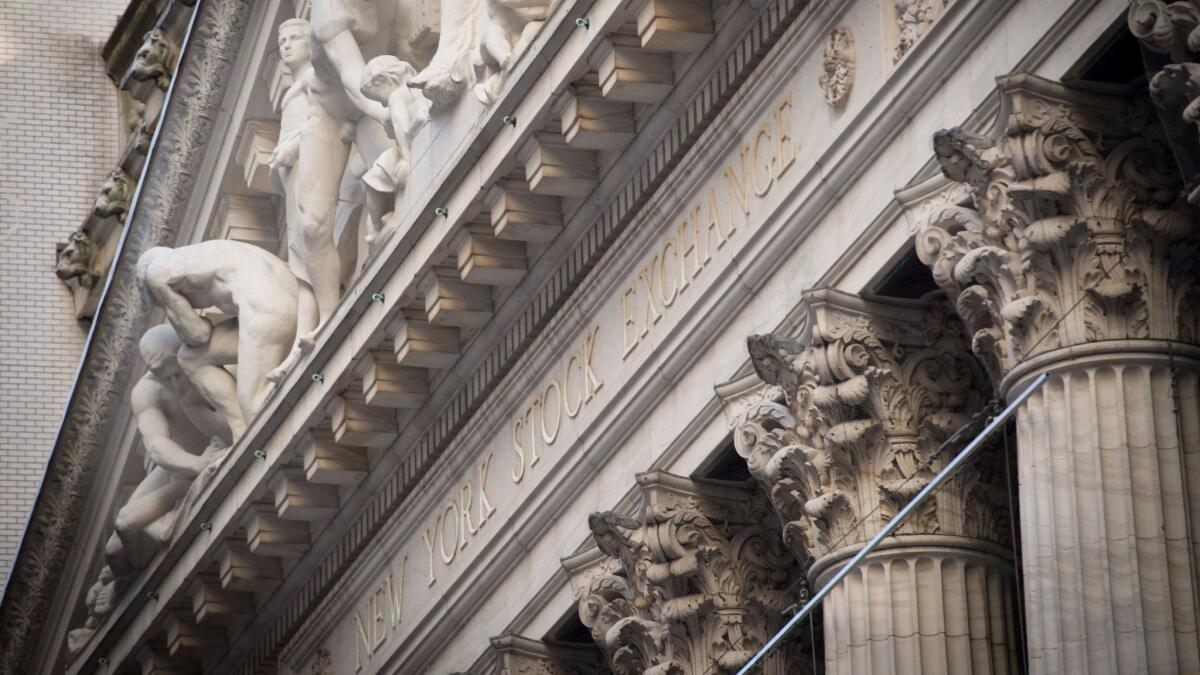Stocks barely move as the bull market turns 8 years old

The New York Stock Exchange in Manhattan.
- Share via
U.S. stocks meandered Thursday as the eighth anniversary of the current bull market turned out to be a quiet one.
Large-company stocks finished mostly higher, but declines in smaller stocks across the board meant that more companies fell than rose on the New York Stock Exchange.
The market started out with small gains, then slipped in the early afternoon. Thanks to late gains for energy companies, major indexes turned higher near the end of trading.
Industrial companies fell as heavy machinery maker Caterpillar continues to slide. Healthcare companies climbed, and banks rose along with bond yields. Trading was light after a three-day losing streak.
The Standard & Poor’s 500 index rose 1.89 points, or 0.1%, to 2,364.87 Thursday. The Dow Jones industrial average edged up 2.46 points to 20,858.19. The Nasdaq composite advanced 1.25 points to 5,838.81. The Russell 2000 index of small-company stocks fell 5.92 points, or 0.4%, to 1,360.12. More than two-thirds of the stocks on the NYSE ended lower.
The S&P 500 is up 250% since March 9, 2009, when it bottomed out in the depths of the financial crisis. The current bull run is the second-longest since World War II, and it may last awhile longer, as wages are growing and hiring appears to be on the rise.
“Bull markets typically don’t die of old age,” said David Lefkowitz, senior equity strategist at UBS Wealth Management Americas. “They typically die because there’s a downturn in the economy.”
Lefkowitz said there are few signs that will happen anytime soon. Although the Federal Reserve is likely to raise interest rates next week, inflation remains low and, he said, the Fed’s actions shouldn’t stifle economic growth.
“The key question is: How quickly does inflation continue to rise from here, and how aggressive does the Fed need to get?” he said.
Healthcare companies made the biggest gains. The leaders included Johnson & Johnson, which rose 1.5% to $125.95. Cancer drug maker Celgene advanced 1.7% to $125.13, while medical device maker Edwards Lifesciences climbed 3.9% to $93.06.
Crude oil prices continued to slip after the U.S. government reported a huge buildup in fuel stockpiles Wednesday. Oil is trading at its lowest price since November, before OPEC countries agreed to reduce production in an effort to shore up prices.
Benchmark U.S. oil fell $1, or 2%, to $49.28 a barrel in New York. Brent crude, the international standard, fell 92 cents, or 1.7%, to $52.19 a barrel in London. Energy companies lost ground early in the day but jumped in the final hour of trading.
Bond prices fell further. The yield on the 10-year Treasury note rose to 2.60%, near its highest level in the last year, from 2.56%. Banks and other financial firms moved up. Wells Fargo rose 0.8% to $58.70 and Intercontinental Exchange ticked up 1.1% to $60.06.
Caterpillar fell 2% to $91.39 as the government investigates the company’s taxes and accounting. It’s down almost 8% since March 1.
American Airlines dropped 3.5% to $43.33, leading airlines lower, after it reported weak February traffic.
Sears Holdings rose 6.9% to $8.01 after the company took a smaller adjusted loss than it did a year earlier. Investors were also pleased the struggling chain kept its inventory and expenses under control.
Signet Jewelers climbed 8.7% to $70.02 after saying it will spend more money on technology as it closes mall-based stores.
Staples slid 5.2% to $8.49 after the office supply company reported fourth-quarter sales that were far weaker than analysts expected and said it will close an additional 70 stores in North America.
Tailored Brands, the parent of Men’s Wearhouse and Jos. A. Bank, plunged 32.2% to $15.84 after disclosing a bigger loss than expected along with disappointing sales. The company also said it wants to rework an agreement with Macy’s, as its tuxedo shops inside Macy’s stores are struggling.
The dollar rose to 114.74 yen from 114.42 yen. The euro rose to $1.0586 from $1.0548.
Wholesale gasoline fell 3 cents to $1.62 a gallon. Heating oil fell 3 cents to $1.53 a gallon. Natural gas rose 7 cents, or 2.5%, to $2.97 per 1,000 cubic feet.
Gold fell for the eighth day in a row, falling $6.20 to $1,203.20 an ounce. Silver fell 26 cents, or 1.5%, to $17.04 an ounce. Copper fell 2 cents to $2.58 a pound.
Britain’s FTSE 100 index sank 0.3% while German DAX rose 0.1% and the CAC 40 in France gained 0.4%. The CAC 40 has jumped 2.5% this month, far more than other major European indexes. Japan’s benchmark Nikkei 225 index climbed 0.3% as a weaker yen lifted shares of exporters. South Korea’s Kospi lost 0.2% and the Hang Seng in Hong Kong dropped 1.2%.
ALSO
RadioShack files for bankruptcy for the second time in two years
A side-by-side comparison of Obamacare and the GOP’s repeal plan
The 25 best-paying jobs in the U.S.? Find a career in healthcare or tech
UPDATES:
2:10 p.m.: This article was updated with closing prices, context and analyst comments.
7:30 a.m.: This article was updated with market prices and context.
This article was originally published at 6:55 a.m.
More to Read
Inside the business of entertainment
The Wide Shot brings you news, analysis and insights on everything from streaming wars to production — and what it all means for the future.
You may occasionally receive promotional content from the Los Angeles Times.










